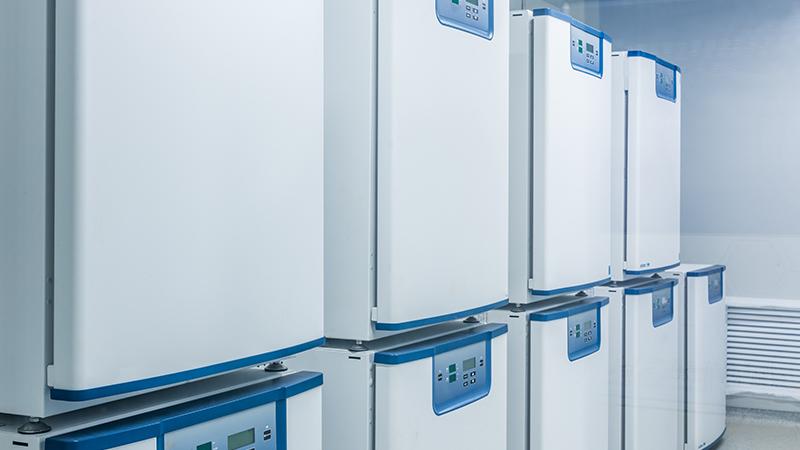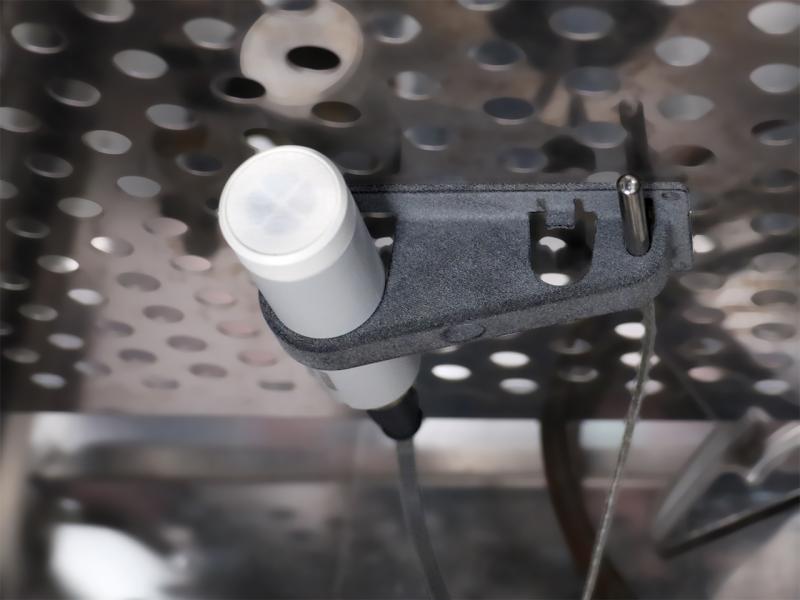CO₂ incubator monitoring

One of the most important devices in producing and researching biopharmaceuticals is the CO2 incubator. Incubators are used for cell culture processes in many applications, including antibody production, tissue engineering, viral vaccine research, reproductive technologies, cell and gene therapies, and toxicity studies.

Modern CO₂ incubators as complex systems
To be effective, incubators mimic the environmental conditions of cells in a living body (in vivo) to enable successful cell growth in media within the chamber (in vitro). Culturing cells requires not only ideal conditions in the media used, but also in the incubator chamber. Further, if batches are not cultivated under controlled conditions, results may not be reproducible.
In cases where a cell culture has failed to proliferate, there are several avenues of troubleshooting to consider. However, the first point-of failure in cell cultivation is often conditions within the incubator. While modern incubators can automatically adjust conditions based upon measurements from sensors within the incubator itself, those measurements may not be accurate.
Unless a CO2 incubator is newly installed and validated, or recently serviced and re-qualified — and presuming the service included a calibration and adjustment of the integrated sensors — relying solely on the incubator’s measurement capabilities is risky. There are several systems that could fail in any incubator. The costs associated with any one parameter being out of tolerance are high; losing samples is only one possibility.

Wireless incubator monitoring
Different processes require different culture conditions. For most human cells, incubators typically maintain a temperature of 37 °C, with carbon dioxide at 5% and relative humidity (RH) at 95%. Stress testing may require higher or lower temperatures, and in some cases gases other than CO₂ are maintained at specified concentrations. External sensors can be added to monitor additional parameters, or to provide redundant monitoring using devices that are easier to calibrate and capable of sending alarms when conditions fall outside tolerance limits.
For carbon dioxide monitoring, Vaisala's GMP251 CO₂ probe, based on Vaisala’s CARBOCAP® technology, delivers long-term measurement stability and low drift with an infrared (IR) light source rather than a traditional incandescent lamp. This significantly extends probe lifetime and reduces maintenance requirements. The probe applies automatic temperature and pressure compensation—essential for accurate gas measurements—and features a heated sensor head to prevent condensation in humid incubator environments.
The GMP251 probe integrated with VaiNet RFL100 wireless data loggers enables faster, simpler installation. Measurement data—both real-time and historical—is securely transmitted to Vaisala’s viewLinc Continuous Monitoring System. With the viewLinc software as the backbone of the system, users get real-time CO₂ trending, configurable alarms, and compliance-ready reports to support GxP-regulations. The RFL100 supports monitoring of multiple parameters, including temperature, relative humidity, CO₂, differential pressure, level, and door status, and delivers remote alarms via text message, email, or phone dial-out.

Reliable CO₂ Monitoring for Incubator Applications
The RFL100 data logger uses Vaisala’s proprietary VaiNet wireless technology to deliver wired-equivalent reliability with superior signal strength in obstructed environments. Designed specifically for incubators, the VaiNet RFL100 CO₂ data loggers support multiple measurement configurations, including CO₂ %, CO₂ % with temperature, or CO₂ % with temperature and humidity.
Purpose-built probe-mounting options enable secure and flexible placement inside incubators without compromising airflow or usability. Optional heat-resistant cables simplify heat-sterilization procedures by allowing the probe to be removed while leaving cabling in place. Probes can also be quickly disconnected for calibration, minimizing downtime and handling risk.
As demand for incubator-based applications continues to grow—driven by reproductive technologies, cell and gene therapies, and infectious disease and vaccine research—accurate, stable measurements are increasingly critical to reproducible processes and product quality. Advances in wireless monitoring, such as the RFL100, combined with smart sensor technologies like the GMP251 CO₂ probe, enable simplified installation, efficient calibration, secure data management, and compliance with GxP regulations—providing researchers and manufacturers with a clear operational and competitive advantage.
Related Products
RFL100 CO2 data logger
The RFL100 data logger uses Vaisala’s proprietary VaiNet wireless technology to monitor temperature, relative humidity, and carbon dioxide across a wide range of environments. Its wireless connectivity and flexible probe options support applications including warehouses, cleanrooms, laboratories, incubators, cold storage areas, freezers, and production areas.
VDL200 data logger
VDL200 is an Ethernet-connected data logger for continuous monitoring applications, offering high-accuracy measurements from up to two detachable humidity, temperature, and CO₂ probes. It also supports the ANP115 Analog Input Probe for analog and Boolean signals. The VDL200 is ideal for real-time monitoring in environments where wired connections are preferred and works with Vaisala viewLinc Enterprise Server.
viewLinc Continuous Monitoring System
The viewLinc Monitoring System combines viewLinc Enterprise Server software with a broad range of monitoring devices to deliver alarming, trend data, and reports that aid in compliance with 21 CFR Part 11 and Annex 11. Designed for GxP-regulated applications, the system integrates Vaisala data loggers, transmitters, and multiple connectivity options to monitor temperature, relative humidity, dew point temperature, CO₂, differential pressure, door switches, and additional parameters. With eleven language versions, the software supports global, multi-site deployments.